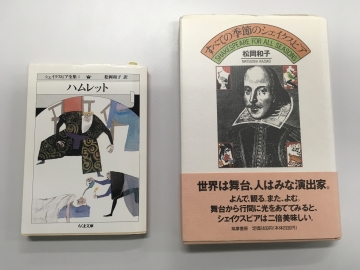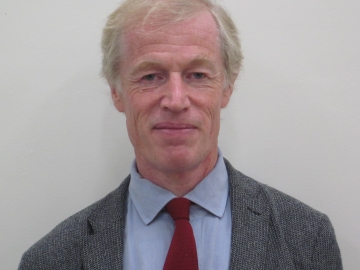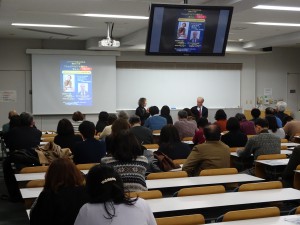Translating Shakespeare into Japanese
To celebrate the 400th anniversary of Shakespeare’s death, Waseda University is organizing a series of events on Shakespeare and his work. On December 16th, the University welcomed Professor Daniel Gallimore from Kwansei Gakuin University and Kazuko Matsuoka, a theatre critic and translator, to discuss the Japanese translations of Shakespeare. Renowned theatre director Yukio Ninagawa used many of Matsuoka’s translations for directing his Shakespearean plays.
Professor Gallimore is the leading researcher on Shoyo Tsubouchi, a Waseda University professor who translated all of Shakespeare’s plays in 1928. He pointed out Matsuoka’s unique use and significance of Japanese idiomatic and mimetic expressions (四字熟語 and 擬態語). For example,
Portia: I prithee, boy, run to the Senate House. Stay not to answer me, but get thee gone. Why dost thou stay?
(William Shakespeare, Julius Caesar (1599). Ed. David Daniell. London: Thomson Learning, 1998.)ポーシャ:お願い、ルーシアス、元老院まで走っていって。返事はいいから行きなさい。何をぐずぐずしているの?
(松岡和子訳『ジュリアス・シーザー』東京:筑摩書房、 2014)
ぐずぐず (guzu guzu) is a mimicking expression meaning tardily, hesitantly, or lingering. Although Matsuoka’s translation is not the exact equivalent of the original script, her choice of words conveys a subtext which the audience may not grasp immediately. This gives energy and meaning to the actor’s or actress’ lines. Moreover, gradually decreasing punctuation and using stronger expressions in the script makes it possible to, as Ninagawa would say it, “turn up [the drama in the play] louder and louder.” Gallimore praised Matsuoka’s translations for conveying Shakespeare’s clever rhetoric, despite it being in Japanese.

- Shakespearean plays translated by Matsuoka
On the other hand, Matsuoka, who will complete translating all of Shakespeare’s work in five books, said that she never noticed that she uses such expressions. “I feel that it naturally became this way as I looked for more suitable words.” Through translating Shakespeare for Ninagawa, Matsuoka said, “I learned the importance of creating a ‘cultural hybrid’ and started to write as if a prince from Denmark or ancient Romans were speaking Japanese.”
Furthermore, she spoke about the differences between translating literature and drama. She commented that, “Even Shakespearean plays, when performed by present actors, they become contemporary drama, reflecting issues and sensibilities of the current world.” Lastly, she shared personal stories about her being behind the scenes of the production of “Richard II,” the very last play the late 80-year-old Ninagawa directed in a wheelchair and with a nasal tube.
About the speakers
Daniel Gallimore

Daniel Gallimore is professor at Kwansei Gakuin University’s Department of Literature, School of Humanities. His research interests are Shakespeare translation and reception in Japan, mainly focusing on the work of the early Shakespeare translator Tsubouchi Shoyo. His major publication includes “SOUNDING LIKE SHAKESPEARE – A Study on Prosody in Four Japanese Translations of A Midsummer Night’s Dream (Kwansei Gakuin University Press, 2012).” He is the member of the Shakespeare Society of Japan and the International Association for Translation and Interpreting Studies. He holds a Ph.D. from the University of Oxford in East Asian Studies.
Kazuko Matsuoka

Kazuko Matsuoka is a translator and theatre critic. She has been working on translating all of Shakespeare’s plays since 1993. She has also served as the planning committee member and translator for the Sainokuni Saitama Arts Theater’s Shakespeare series, directed by Yukio Ninagawa. Her major publications include “Subete no Kisetsu no Shakespeare [Four Seasons of Shakespeare] (Chikuma Shobō)” and “Kaidoku Shakespeare [Easy-reading Shakespeare] (Chikuma Bunko).” Matsuoka has also translated many works of Shakespeare from Chikuma Bunko. She is the member of the Shakespeare Society of Japan and the International Association of Theatre Critics. Matsuoka holds a Master’s degree from the University of Tokyo.
Event information
Date: December 16, 2016
Venue: Room 681, Building 36, Toyama Campus, Waseda University
Organized by the Global Japanese Studies Unit and the Ryusaku Tsunoda Center of Japanese Culture



